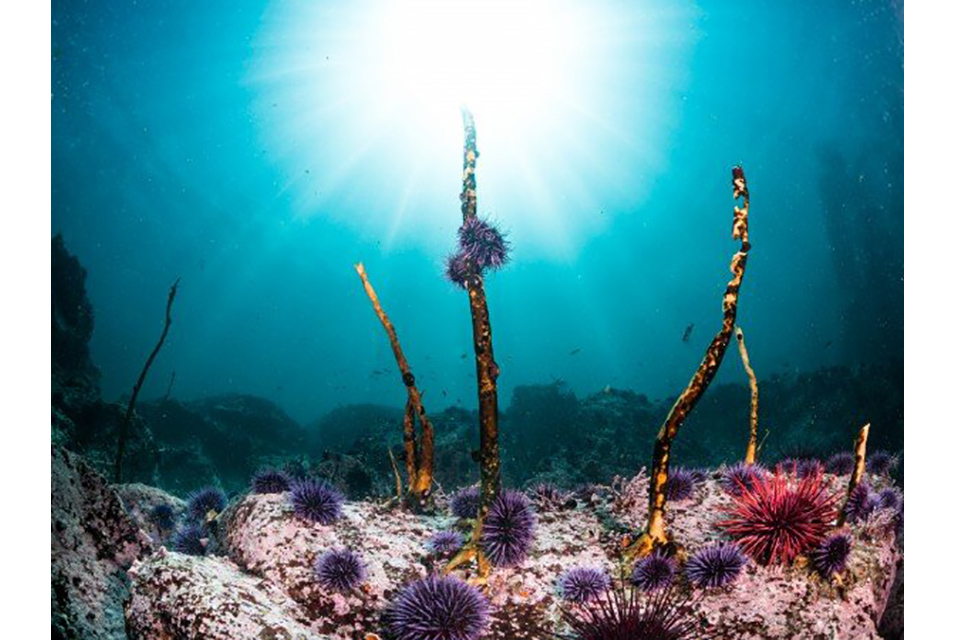FALMOUTH, MA.- A new study published in PLOS ONE provides novel documentation of kelp forest decline along the west coast of the U.S. and Mexico in response to the 2014–2016 record-breaking marine heatwave, along with evidence of regional recovery. Using Kelpwatch.org, an open-source web tool used to visualize and analyze nearly 40 years of kelp canopy dynamics data derived from satellite imagery, the study uncovers a north-to-south pattern in kelp decline and recovery from the marine heatwave, for both giant kelp and bull kelp canopies.
The study, a collaboration between The Nature Conservancy,
Woods Hole Oceanographic Institution, and the University of California Los Angeles, documents an unprecedented and sustained decline in canopy-forming kelps along the Monterey Peninsula, as well as reasons for hope with recovery in other regions such as Rogue Reef in Oregon and Bahía Tortugas in Mexico.
Kelp forests span thousands of kilometers of coastline in western North America but changing ocean conditions have led to imbalanced ecosystems and subsequently precipitated the loss of kelp along many stretches of coastline. The new study shows that the response and recovery of canopy-forming kelps to stressor events can vary in both space and time.
"The story varies from place to place. Some areas experienced declines, but we are also seeing resilience of kelp forests in other regions. The most important part, though, is that through Kelpwatch.org we can now get this information to managers and stakeholders more effectively to help protect vulnerable regions," said Dr. Henry Houskeeper, a postdoctoral scholar at Woods Hole Oceanographic Institution and co-author on the study.
One potentially vulnerable region, the Monterey Peninsula, historically hosted dense and thriving kelp forests. But the lingering effects of the 2014 marine heatwave have resulted in a decline in kelp and a rise in native purple urchin density that create 'urchin barrens'—underwater carpets of urchins that have devoured their food supply and can persist in an emaciated state for decades. And with the overlapping crash in the population of sunflower sea stars, the prominent remaining predator of kelp-eating purple sea urchins in the region is sea otters, known to avoid eating starving urchins from barrens.
"Monterey is the definition of a baseline shifted. It's like an ecological bomb went off. The old-timers don't dive here much anymore because it's too depressing, and us youngsters hold on to documenting the remaining relics of a collapsing kelp cathedral. Everywhere you look, there are ecological outlines of animals that used to live here occupied by creatures imported by warming seas. What if there was a forest fire that burned cold, without flame or smoke? Would anyone notice?" said Patrick Webster an underwater photographer and marine science communicator based out of Monterey Bay, California.
A prior study led by Dr. Josh Smith found that after the ecosystem collapse starting in 2014, a patchy mosaic of kelp forests interspersed with purple urchin barrens formed around the Monterey Peninsula and was being maintained by sea otters selectively foraging for well-fed urchin in the kelp patches and avoiding starving urchins from barrens.
"The new Bell et al. paper indicates that while precipitous declines in kelp may be evidenced across large regions, more nuanced mosaics may develop at smaller spatial scales, especially in places where predators like sea otters alter their foraging behavior in response to sea urchin outbreaks. Importantly, in this system, the remnant patches of kelp forests indirectly maintained by sea otters are crucial for the persistence of giant kelp along the central coast because these remnant forests could provide kelp spores that eventually replenish the barren patches," said Dr. Smith in response to the new study's findings.
"Kelp forests around the Monterey Peninsula were some of the most persistent in California," said Dr. Tom Bell, an assistant scientist at Woods Hole Oceanographic Institution and lead author of the study. "It was surprising to find that not only were there reductions in kelp canopy during the heatwave period, but canopy area continued to decline even after cooler ocean temperatures returned. We were expecting some reductions in kelp canopy, but discovered a greater than 80% loss compared to the historical average across approximately 40 kilometers of coastline from the Monterey Harbor to Carmel Highlands," Dr. Bell concluded.
The study's authors call for enhanced data-driven management of kelp forests throughout their west coast range amid historic and sustained declines in this important ecosystem that provides crucial services to both people and nature. "Our team created Kelpwatch.org to advance state-of-the-art kelp forest monitoring and this study demonstrates how this tool can be used to track near-real-time changes in kelp forest canopy and proactively identify regions experiencing sustained declines fit for management action," said Vienna Saccomanno, an ocean scientist with The Nature Conservancy who leads the group's Kelp Mapping and Monitoring Program and is a co-author on the study.










